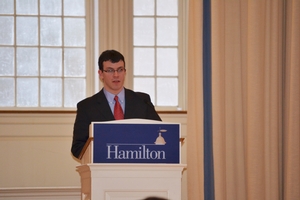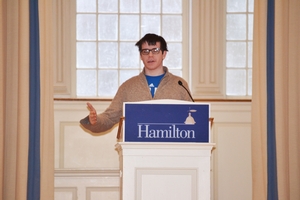2011 Public Speaking Contest: Orators turn talking points
into compelling rhetoric
by Kate Moore '12
NEWS EDITOR
Anyone interested in the debauchery of professional athletes, the human obsession with time or the impact of modern technology on today’s generation will be eager to learn the results of the preliminary rounds of the 2011 Public Speaking Competition. Twenty-seven Hamilton students competed earlier this week to inform and persuade their peers about various socially-significant issues. The finalists will be notified of their standing on or before Friday, Feb. 18.
“By the final round on March 5, audiences are hearing the best of the best,” said Professor Cheryl Casey, visiting assistant professor of Communications.
 Students may compete for three public speaking prizes. The Warren Wright Prize is open to all students who have taken, or are currently enrolled in, the Rhetorical Act public speaking course. This speech must be informative, and only one winner will receive the $5,600 prize. The McKinney Prize is open to all students and must be persuasive. One winner from each class will receive the award, with $550 for each underclassman and $1,100 for the senior winner. The Clarke Prize is open to all seniors and includes an essay as well as a speech. This year’s topic requires participants to explore the intersection of sports, ethics and accountability in light of recent ethically questionable actions of high profile athletes. One winner will receive $1,500.
Students may compete for three public speaking prizes. The Warren Wright Prize is open to all students who have taken, or are currently enrolled in, the Rhetorical Act public speaking course. This speech must be informative, and only one winner will receive the $5,600 prize. The McKinney Prize is open to all students and must be persuasive. One winner from each class will receive the award, with $550 for each underclassman and $1,100 for the senior winner. The Clarke Prize is open to all seniors and includes an essay as well as a speech. This year’s topic requires participants to explore the intersection of sports, ethics and accountability in light of recent ethically questionable actions of high profile athletes. One winner will receive $1,500.
“When participants are successful in their efforts, audiences are persuaded, informed and entertained,” said Casey.
During the preliminary rounds on Feb. 12 and 14, speeches were limited to three to five minutes. Students of various skill and experience levels signed up to share their thoughts and opinions with an audience of peers and faculty.
“I signed up for the public speaking competition because I competed in speech and debate all throughout high school,” said Jessica Moulite ’14. “My topic was based on technology and how it’s affecting our generation, especially in regards to how we communicate with one another.”
“This year my speech was entitled ‘The Moment Itself’ and I talked about how our obsession with time controls us. Time is thought of as another commodity and as a result, we are obsessed with saving it,” said Rachel Pohl ’11. “I chose my topic because I think we forget to take the time, especially as students, to enjoy ourselves and spend as much time as possible with the people we care about.”
“I signed up for the competition to apply some of my lessons from Political Oratory, and because I simply enjoy speaking, having done speech and debate in high school,” said Max Schnidman ’14. “I wrote a speech in favor of school vouchers, and I feel my speech was effective at making a case for them.”
Participants also have access to a coach, Co-Director of the Oral Communication Center James Helmer. Thus, competitors are able to receive assistance when  developing topic ideas, important feedback after the preliminary round, and explanation of evaluation criteria. Standing at the podium in the Chapel can be a daunting task, but the guidance of a coach can help students with different levels of public speaking experience be more comfortable when presenting their information or argument.
developing topic ideas, important feedback after the preliminary round, and explanation of evaluation criteria. Standing at the podium in the Chapel can be a daunting task, but the guidance of a coach can help students with different levels of public speaking experience be more comfortable when presenting their information or argument.
“I participated in the public speaking competition because it is a great opportunity to work on persuasive writing and to practice speaking in front of a crowd, working up those public speaking nerves, and then overcoming them. Public speaking is simply a rush for me,” said Michael Bethoney ’11. “And the potential for that cash-prize wasn’t a bad incentive either.”
“The most important feature of this event is that it calls for participants to showcase not simply presentation skills, per se, but an understanding of all of the elements that go into structuring an effective speech,” said Casey. “Participants must understand their audience, establish credibility, and provide well-organized, supported arguments--all while implementing appropriate language and engaging delivery techniques.”
“I thought that it would be a great opportunity to put my public speaking skills to the test in an actual competition setting...where I would be positively criticized and possibly more harshly judged,” said Christopher Delacruz ’13.
“As a school that prides itself on skillfully teaching students how to communicate in both the written and oral form, it is important to provide a forum to discuss our ideas and persuade others. The public speaking competition is a wonderful and unique opportunity to do so,” said Pohl.
The finalists will deliver their speeches on March 5 from 1-5 p.m. in the Chapel. Winners will receive their prizes at the Class and Charter Day ceremony in May.
